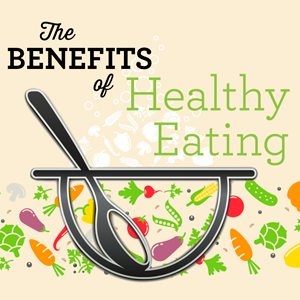The Benefits of Healthy Eating infographic discusses ways to eat better to live longer and enjoy your life.
The Benefits of Healthy Eating
Your body needs a lot of support
Including:
Substances that provide energy
Building blocks for bone, muscle, organs, hormones, and blood
Substances needed for processes to occur in the body (like digestion)
Substances that protect the body
Energy
Featured Programs
Energy content by material consumed:
1 gram of fat/37 k
1 gram of alcohol/29 kJ
1 gram of carbohydrates/17 kJ
1 gram of protein/17 kJ
1 gram of dietary fibre/8 kJ
[# Kj is kilo joules–energy measurement]
Reference value per day for an adult 8,700 KJ a day.
Protein, fats and carbs are converted into energy
Vitamins and minerals are not
Total Makeup
Total: 546.3 grams
Fat–70 grams/12.8%
Saturated fat-24 grams/4.4%
Sodium- 2.3 grams/.42%
Protein: 50 grams/9.1%
Carbohydrates: 310 grams/55%
Sugars: 90 grams/16.5%
Note: Reference values are acceptable amounts of the previous substances. They are not a goal, or an average.
Fat
Reference value per day for an adult 70 grams
All fat= contributes to energy intake and helps absorb vitamins
–saturated fat=from animal sources
—-Reference value per day for an adult 24 grams
–unsaturated fat=from vegetable sources
Sodium
Reference value per day for an adult 2,300 milligrams. Salt in moderation is good.
It helps:
1) Maintain fluid equilibrium
2) Assist nerve impulses
3) Help muscles contract and relax
Protein
Reference value per day for an adult 50 grams
Important for the growth and repair of cells and muscle. Also an important source of energy.
Carbohydrates
Reference value per day for an adult 310 grams
–Sugars (subset of carbs)
—-Reference value per day for an adult 90 grams
Recommended daily dose of the following Vitamins & Minerals:
Vitamins:
(in descending order)
C- 75 MG
B3-18 MG
E- 10 MG
B5-6 MG
B6-2 MG
B2-1.6 MG
B1-1.4 MG
A- 600 micro grams
Folate- 400 micro grams
K 80 micro grams
Biotin- 30 micro grams
B12-6 micro grams
D-5 micro grams
Minerals:
(in descending order)
Potassium-3500MG
Chlorine-3400MG
Sodium-2400MG
Phosphorous-1000MG
Calcium-1000MG
Magnesium-350MG
Boron-20MG
Iron- 15MG
Zinc-15MG
Manganese-5MG
Flourine-3.5 MG
Copper-2MG
Vanadium-1.8MG
Nickel-1MG
Iodine-150 micro grams
Chromium-120 micro grams
Molybdenum-75 micro grams
Selenium-35 micro grams
A few of your favorite foods cover everything you need
Good sources of the following nutrients:
Calcium: Yogurt, cheese, salmon, perch, soybeans, white beans, spinach, oatmeal
Potassium: Sweet potatoes, white beans, lima beans, kidney beans, yogurt, bananas, halibut, cod, and tomato paste.
Magnesium: Pumpkin, Artichoke, soybeans, white beans, navy beans, tofu, brown rice, cashews, peanuts
Vitamin A: liver, sweet potatoes, cantaloupe
Vitamin C: guava, oranges, kiwi, strawberries, Brussels sprouts, broccoli, sweet potatoes
Vitamin E: Sunflower seeds, pine nuts, peanuts, turnip greens, spinach, and tomato paste.
Eating well can add a DECADE to your life
Soup or salad? +2 years
1 cup of raw vegetables daily
Cooking depletes 30% of antioxidants in vegetables
Nuts +3 years
Heart-healthy mixes include walnuts
Aim to eat 2 oz a day
Eating nuts daily lowers total cholesterol by 5% and bad cholesterol by 7.5%[3]
Lay off the fat +3 years
Stay between 20-25 BMI
BMI= Body Mass Index
It’s Simple–weight (lb)/[height (in)]^2 x 703
Or weight (kg)/ height (m)
Example:
weight (155 lbs)/[height (72 in)]^2 x 703=21
Only Veggies +8 years
Smokers live 8 years less than non-smokers
Normal eaters live 8 years less than vegetarians
While fast foods can take years off your life
Smoking, drinking, not exercising, and eating poorly
Take an average of 12 years off your life.
that’s the difference between living into your 80’s, and your late 60’s
Bad diets can hurt you
Due to:
1) Too much sodium – Leading to high blood pressure, heart disease
2) Trans Fats – Leading to the risk of diabetes, heart attack, stroke
3) Digestive Problems – Like gastroesophageal reflux disease and irritable bowel syndrome
4) Too much sugar – Leading to insulin resistance (and diabetes)
5) Empty Calories – Leading to increased weight and not enough nutrients
Eating well helps your chemistry. And it takes a lot of chemistry to keep you in a good mood.
Trytophan–>helps create seratonin
Seratonin–>leads to restful sleep and a stable mood
Trytophan is found in: Protein foods: cheese, poultry, eggs, fish, meat, soy products and milk.
Hypoglycemia = low blood sugar Causes hunger, shakiness, irritability.
Solved by glucose from regular, healthy meals.
Mental Health
2/3rds of those with no mental health issues enjoy diversified and fresh food
half of those who have mental health issues enjoy diversified and fresh food
Eating healthy enables you to enjoy your life.
Related:

